Category: "Bugs"
Пчела
The Russian word пчела means 'bee'. It is end-stressed in the singular and root stressed in the plural. It declines like so:
| Sg | Pl | |
| Nom | пчела | пчёлы |
| Acc | пчелу | пчёл |
| Gen | пчелы | пчёл |
| Pre | пчеле | пчёлах |
| Dat | пчеле | пчёлам |
| Ins | пчелой | пчёлах |
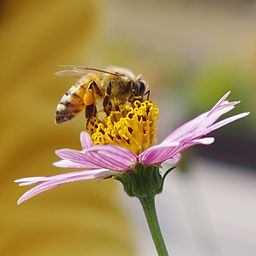
Russia actually has an abundance of bees. Just a little while ago Russia sent some of their bees over to America to help revive the dwindling bee population. These Russian honeybees are really helping to boost bee populations around the world along with Italian honeybees.
Here are some example sentences:
| У меня пчела в волосах! | There's a bee in my hair! |
| Достань соты из улья, но осторожно, а то пчёлы ужалят. | Get the honeycomb out of the beehive, but be careful or the bees will sting you. |
| У меня аллергия на пчёл. | I'm allergic to bees. |
| Когда его ужалила пчела, он опух, как воздушный шар. | When the bee stung him, he swelled up like a balloon. |
Жук
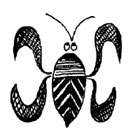
My favorite letter of the Russian alphabet has always been Ж. When I was younger I called it "the bug letter" because it kind of looks like a bug. Conveniently, it is also the first letter of the Russian word for bug, жук. The plural of our word is, жуки. To be precise, the word means beetle, a type of insect that has hardened wing-coverings:

Жук полетел прямо на меня!
The beetle flew right at me!
If the context does not demand scientific precision, then one might use the word ‘bugs’ in English translation:
Ещё три жука влетели в комнату.
Three bugs flew into the room.
Since I am terrified of bugs, if the above examples were in real life, I would be running out of that room. Especially if the жук were a cockroach. Blech!
The diminutive form of the word is жучок in the singular and жучки in plural. You can use this form if the bug is tiny or if the context is informal. Diminutives of animal words are also often used when talking to children or when children are talking about animals.
Дима смеялся над Машей, потому что она убежала от жучков.
Dima laughed at Masha because she ran away from the bugs.
Это всего лишь маленький жучок!
It's just a little bug!
In American slang we often refer to a minor sickness as a bug; Russians don't do this. So if you say “У меня жук в желудке” to mean “I have a stomach bug,” then Russian people will think that you literally you swallowed a beetle.
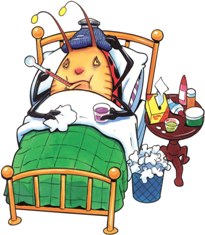
Мурашки
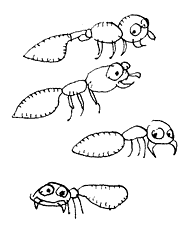 I don’t like most horror movies. There is always a naïve dummy being led into the hands of an evil master, who is driven by his utter insanity or various psychological issues. All this blood spill doesn’t do anything for me except for giving me an uneasy feeling in my stomach. Personally, I prefer suspense. I like that little chill and goose bumps you get when thinking “Can this really be possible?”
I don’t like most horror movies. There is always a naïve dummy being led into the hands of an evil master, who is driven by his utter insanity or various psychological issues. All this blood spill doesn’t do anything for me except for giving me an uneasy feeling in my stomach. Personally, I prefer suspense. I like that little chill and goose bumps you get when thinking “Can this really be possible?”
In Russian the goose bumps are called «гусиная кожа» “goose skin.” However, a more folksy word is мурашки.
The reason мурашки is used to describe this feeling is because this is also a word for ants or other little insects. Therefore, «мурашки по коже побежали», “ants ran on the skin” is probably one of the most used expressions to describe goose bumps along with the feeling causing them. (Insects running on your skin… mmmagical feeling… ![]() Gross!)
Gross!)
| Я люблю читать, сидя у большого дуба у реки. Только вот там очень много всяких мурашек и букашек бегает... | I like reading next to a big oak tree over by the river. Too bad there are a lot of ants and other bugs there… |
I am not sure what the context should be but I suppose you one could talk about a singular goose bump, мурашка, even though it is usually seen in its plural form. However, мурашка can definitely be used when talking about an ant.
Just like in English, you can get мурашки from being cold or overcome by feelings, either positive or negative.
| Когда я слушаю музыку Моцарта, у меня аж мурашки по коже! | When I listen to Mozart’s music, I get goose bumps! |
| — Тебе Коля рассказывал, как он по темноте домой вчера возвращался? — Да, страшно так, у меня муражки по коже пробежали! |
“Did Kolya tell you how he was getting home in the dark yesterday?" “Yes, so scary, I even got the goose bumps!” |
| Какая ужасная история! У меня мурашки выступили! | What a horrible story! I got goose bumps! |
| Тебе не холодно? Смотри, ты вся в мурашках! | Are you cold? Look, you are all covered in goose bumps! |
| Когда меня начальник к себе вызвал, у меня муражки по спине пробежали: думала, уволит! | When my boss called me in to see him, I got goose bumps: I thought he was going to fire me! |
Гусеница
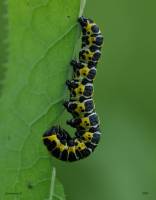 Recently I wrote about bugs and how their little legs can make us shudder uncontrollably. That made me think about something even more horrifying: caterpillars. Even though some of them are really pretty with their perfect little geometrical figures on their skin, I can hardly bring myself to get near one… and as for touching them — forget it!
Recently I wrote about bugs and how their little legs can make us shudder uncontrollably. That made me think about something even more horrifying: caterpillars. Even though some of them are really pretty with their perfect little geometrical figures on their skin, I can hardly bring myself to get near one… and as for touching them — forget it!
In Russian caterpillar is гусеница. It is a noun of feminine gender that incidentally has nothing to do with гусь “goose” that seems to have the same root.
| Sg | Pl | |
| Nom | гусеница | гусеницы |
| Acc | гусеницу | гусениц |
| Gen | гусеницы | |
| Pre | гусенице | гусеницах |
| Dat | гусенице | гусеницам |
| Ins | гусеницей | гусеницами |
Some dream interpretations suggest that seeing a caterpillar in your dream means getting involved with something undesirable, causing you distress. A caterpillar on your clothes that can’t be shaken off means some unpleasant encounters in the future. However, if you squish a caterpillar in your dream, good luck won’t leave your side. (source)
| У этой гусеницы большая оранжевая голова и жёлтые ножки. | This caterpillar has a big orange head and yellow legs. |
| Миша нашёл огромную зелёную гусеницу в саду и решил подарить её Маше. Маша подарка не оценила и с воплями убежала. | Misha found a huge green caterpillar and decided to give it to Masha as a gift. Masha did not appreciate the gesture and ran off screaming. |
| — Ты боишься гусениц? — Ужасно! Они такие мерзкие! |
“Are you afraid of caterpillars?” “Terribly! They are so disgusting!” |
| У нас в саду очень много гусениц, вот я туда и не выхожу! | There are a lot of caterpillars in our garden, so I just don’t go there. |
| Не подходи к этим кустам - они покрыты гусеницами! | Don’t get near those bushes: they are covered with caterpillars. |
I remember when I was little, my friends and I were playing on the swing we had in our garden. That swing was big enough to fit several people. Being a good girl, I took my shoes off and climbed onto the swing ready to have fun. Little did I know what my friends were plotting. They found a big fuzzy caterpillar with a green body and a bright orange head and placed it carefully in one of my shoes. When I finally put my shoes back on, I could feel that my foot was not alone in there. ![]() As soon as I realized what it was, I jumped so suddenly that the swing jerked and folded in half, dumping us all on the ground. I remember shrugging and screaming but the joke was on my friend who pulled the prank — he landed on the caterpillar!
As soon as I realized what it was, I jumped so suddenly that the swing jerked and folded in half, dumping us all on the ground. I remember shrugging and screaming but the joke was on my friend who pulled the prank — he landed on the caterpillar! ![]()
Божья коровка
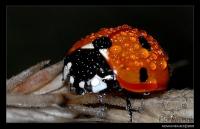 Bugs gross out many people. However, very rarely you can find a person who is afraid of ladybugs. There is something so cute about them that even when their little legs touch your skin you don’t want to shake them off. Well, at least I wouldn’t. I remember playing with my friends as a kid, trying to get ladybugs to land on our palms. However, the bugs were smart enough to choose flower tops over us… I guess I shouldn’t take it personally; they were probably just hungry
Bugs gross out many people. However, very rarely you can find a person who is afraid of ladybugs. There is something so cute about them that even when their little legs touch your skin you don’t want to shake them off. Well, at least I wouldn’t. I remember playing with my friends as a kid, trying to get ladybugs to land on our palms. However, the bugs were smart enough to choose flower tops over us… I guess I shouldn’t take it personally; they were probably just hungry ![]()
Interestingly enough, in Russian a ladybug is called «божья коровка», which is literally “God’s little cow”. I guess the “little cow” part is plausible because of the black spots on the bug’s back. Also, it turns out that ladybugs secrete special orange milk that comes from the insect’s joints when they are in danger. It has a bitter unpleasant taste, which makes animals and other insects change their mind about eating a ladybug. But what about «божья», what does this bug have to do with God? One possible reason is that the word «божий» used to be used as “nice”, “peaceful”, and “harmless”. This bug is traditionally considered an herbivore, whereas in reality it feeds on plant lice (source). So I bet the latter would not be too fast to call a ladybug cute or harmless… ![]()
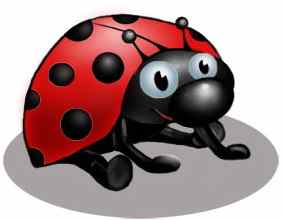
| — Смотри, я поймал божью коровку! — Молодец, а теперь отпусти её! |
“Look, I caught a ladybug!” “Well done, now let it go!” |
| На Хэллоуин я буду божьей коровкой. | I am going to be a ladybug for Halloween. |
| — Как тебе это платье? — Так себе, ты выглядишь, как божья коровка! |
“How do you like this dress?” “So-so, you look like a ladybug!” |
| Трёхлетний Вася решил покормить божью коровку и принёс ей цветочек. | Three-year-old Vasya decided to feed a ladybug and brought it a little flower. |
Also, there is a band in Russia called «Божья коровка». It was formed in the 90's and and still active today. They don't really have a single style, so for lack of a better word we might call it soft pop; however they also sing блатные песни (a style of songs based on prison camp themes and criminal life), and sometimes they do little parodies. Here, I would like to share one that they did in response to Mambo Number 5 by Lou Bega. They called it «Мамбо по-русски», "Russian Mambo".
I wouldn't be surprised if there aren't many people who have heard of this band. I came across their name only when doing my research on ladybug. But I hope that this video will make you smile, just like it did me! ![]()
PS. If you would like to see the video along with words & translation, simply click here.